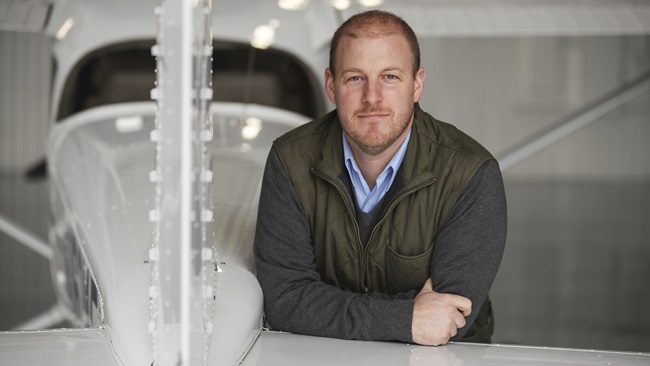Skyborne Academy innovates flight training
Airline partnerships, selective admissions
Skyborne a professional aviation academy launched in the United Kingdom, recently opened a campus in Vero Beach, Florida, and aims to change how airline pilots are trained.
Skyborne cofounder and CEO Lee Woodward is a pilot with over 30 years of experience in the aviation and airline industry, including flying the Boeing 757, 767, and 747-400 for British Airways and eventually becoming a training captain in the 757. Woodward was also COO of CTC Aviation Group, one of the largest independent aviation training companies in the world, until 2015 when CTC was acquired. Skyborne was created in part to test Woodward's belief that the traditional pilot training model expends too many resources—both trainer's and trainees' time and money—teaching pilots who lack critical skills or aptitude to thrive as professional pilots, and too often such shortcomings come to light late in the process.
Skyborne’s immersive program is more selective about admissions than many traditional flight schools.
“We’re fastidious about pilot selection,” Woodward explained. “I’m very sensitive to the fact that youngsters are going to be paying a fairly phenomenal amount of money to come into training. … We have a duty of care to all trainees to make sure they have what it takes from the start.” When discussing the “eyewatering drop-out rate” at many of the flight schools across North America, Woodward said, “keeping the dropout rate and the training overrun rate to a minimum is key.”
The selection process, according to Skyborne’s selection process guide, allows the academy to “identify whether you have the strengths required to progress through the training and make a good career pilot at the end.”

“We are building and creating elite airline pilots. … if you think of the training program as an extended selection process, that’s what it’s about, it’s about continuing to train the airline philosophies, albeit in light aircraft, and getting the pilots ready for airline operations,” Woodward said.
Skyborne’s cadet selection process starts with an application and the AON pilot assessment tool, which, Woodward explained, is a “series of aptitude tests, done online.” There is also a psychometric test, which uses task analysis to “get at skills and preferred behaviors that an individual has to make sure it’s conducive to being an airline pilot.” Successful candidates then move on to an online competency-based interview, with accessors. “In a very gentle way,” Woodward continued, “We guide the trainees through that interview process to really just confirm they have what it takes before they start training.”
Woodward said the AON pilot assessment tool is used by a number of airlines, and CTC was one of the first to use it back in 2014.
Woodward said that the selection process allows Skyborne to craft “bespoke” training for each candidate. “We all have strengths and weaknesses, and it’s those areas perhaps of weakness, that we want to shore up through the training program. We get to see that in selection, and so we can just adapt our training a little bit … to make some inroads into those weaknesses and actually then capitalize on the strengths.”
The program, from start to finish, typically takes about 12 months; the U.K. course is slightly longer. The program takes students from private pilot through CFI. Some trainees, depending on their desires and performance, may be employed as a Skyborne CFI where they will further develop their skills, through CFII and multiengine instructor until they are ready to head to the airlines.
The program costs around $86,000 and includes all instructional time, uniforms, equipment (headset, iPad, ForeFlight, and books), background check, and on-site accommodations. Skyborne has recently unveiled that it is working with Sallie Mae, a publicly traded consumer banking company that provides student loans, to create financing options for pilots training in the United States.
Skyborne trainees in the U.K. and Europe, because they don’t have the 1,500-hour minimum, Woodward said, “will leave the flight school and within months or within weeks, in some cases, they’ll be flying Airbus’ and 737s with airlines.” Those in the United States, with the restricted ATP, will work as Skyborne instructors until they can leave for the airlines.
Skyborne has agreements with various airlines to train pilots for various pathway programs at United Airlines, Skywest Airlines, Endeavor Air, and Envoy Air.
Skyborne is also innovating for its students’ mental health by partnering with U.K.-based company Red Umbrella, a mental health awareness and fitness program. Students and staff have access to discreet peer-to-peer mentoring, and, if needed, will be referred to sessions with trained counselors and occupational psychologists. “It’s always been an aspiration of the directors at Skyborne to do this.” Woodward explained, “We are really, really proud of it. The feedback we’ve had from staff and students who’ve used it, is that it’s absolutely delivered what they needed. And of course it's ultra-discreet, so we don’t hear anything of it. Just every now and then a student or staff member will voluntarily come in and say, ‘I’ve used it and it worked.'”
Looking into the future, the academy hopes to take delivery of 10 fully electric training aircraft from Bye Aerospace in Colorado next year. Skyborne also plans to announce a bachelor’s degree program in the United States, as well as a Part 147 maintenance school next year.





